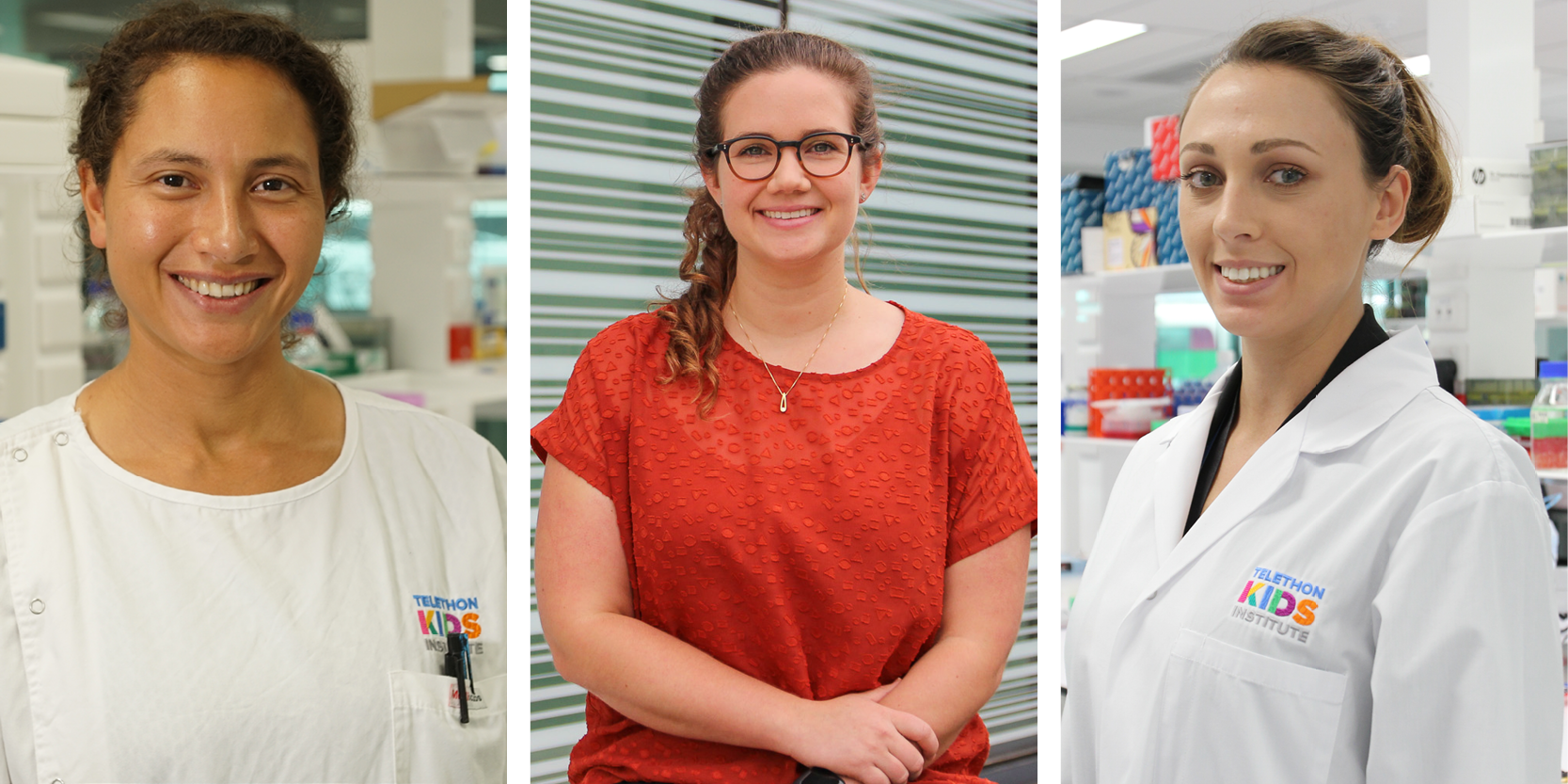
Pictured: Dr Nelly Amenyogbe, Dr Penelope Strauss and Dr Rachael Zemek
Three outstanding young researchers from The Kids Research Institute Australia have been named Raine Fellows and received valuable Raine Priming Grants to support their child health research.
The recipients were announced at the Raine Awards Ceremony yesterday. Held annually by the Raine Medical Research Foundation, the awards recognise and provide funding support to Western Australian health and medical scientists and clinicians.
The Raine Priming Grants, in particular, support health and medical students and clinicians who are at an early stage in their research career – providing funding for research into any area of medical science that investigates the nature, origin and cause of human disease, and the prevention, cure, alleviation and combating of such disease.
Applications are ranked on scientific excellence, with the top applicants in their relevant research areas being named Raine BrightSpark Fellows or Raine Cockell Fellows.
Cancer immunologist Dr Rachael Zemek, from the The Kids Cancer Centre, was named a Raine BrightSpark Fellow after being ranked a top applicant in the area of child health. She received $244,360 for her work focused on paediatric sarcoma (tumours which occur in the bones and soft tissues). In particular, she is working on therapies which use the body’s own immune system to help prevent relapse following surgery to remove tumours.
Also named a Raine BrightSpark Fellow and top applicant in the area of child health was microbiome researcher Dr Nelly Amenyogbe, who received $242,793 to support her work in tackling newborn mortality, particularly due to sepsis. Her project will work to unravel the host response to vaccines, to better understand why some newborns respond to vaccines like BCG (used to target tuberculosis but recognised as having wider protective effects against infection, amongst other things) and others don’t.
Research Fellow in Youth Suicide Prevention Dr Penelope Strauss was top applicant in the area of mental health. Named the Raine Cockell Fellow, she received $244,886 to continue her work enhancing suicide prevention for LGBTQA+ young people. Young people of diverse gender and sexuality experience elevated rates of poor mental health, self-harm and suicidality compared to their non-LGBTQA+ peers. Dr Strauss will undertake studies designed to better understand factors behind mental health difficulties and suicidality in LGBTQA+ young people; and will build on earlier work to co-design a digital intervention tailored to the needs of LGBTQA+ young people.
Clinical Research Fellowships
Excitingly, two up-and-coming Child and Adolescent Health Services (CAHS) clinicians who are also researchers with The Kids Research Institute Australia received Clinician Research Fellowships (CRF) at the Raine Awards Ceremony.
Infectious diseases consultant at Perth Children’s Hospital, Dr Charlie McLeod, and senior respiratory physiotherapist with CAHS, Dr Pam Laird, received two of four fellowships awarded under the CRF program.
The program is funded by the Future Health Research and Innovation Fund in partnership with the Raine Medical Research Foundation, with support from the WA Department of Health. It is designed to support WA Health employees in pursuing high-quality research that will ultimately provide better healthcare outcomes in WA’s public health system.
The fellowships will enable Dr McLeod and Dr Laird to undertake research while still maintaining their clinician roles with WA Health and CAHS. Dr Laird will undertake her research with the Wal-yan Respiratory Research Centre – a powerhouse partnership between The Kids Research Institute Australia, Perth Children’s Hospital Foundation and Perth Children’s Hospital; while Dr McLeod will undertake her research with the Wesfarmers Centre of Vaccines and Infectious Diseases at The Kids.
Dr McLeod will use her fellowship to produce and optimise a validated model to aid decision-making around antibiotic use in young children with lower respiratory tract infection. The aim is to reduce unnecessary antibiotic use in this age group.
Dr Laird, whose research focuses on chronic lung disease in Aboriginal children, will use her fellowship to explore how research informed by Aboriginal perspectives and experiences in healthcare settings and communities can improve lung health outcomes in Aboriginal children.
Publication Prize
Head of Ear Health at The Kids Research Institute Australia and Associate Professor at Curtin University, Dr Chris Brennan-Jones, was also recognised at this morning’s ceremony – awarded the $5,000 2021 Raine BrightSpark Research Prize for his article entitled Topical antibiotics for chronic suppurative otitis media (CSOM).
The prize recognises the early career researcher with the most outstanding scientific paper in the area of child health research. Dr Brennan-Jones’ paper, which represented the most extensive study yet of the effectiveness of treatments for CSOM, attracted international attention and has helped to inform National Health and Medical Research Council policy and the inaugural World Health Organization Report on Hearing.
Raine BrightSpark Research Collaboration Awards
The Kids Research Institute Australia and the University of Western Australia researcher, Dr Akila Rekima, was awarded funding for a collaboration with the Amsterdam University Medical Centre. It will examine the role breast milk in the early days of life plays in healthy gut development and the prevention of allergies and disease.
For more information on the Raine Medical Research Foundation grants and fellowships, see here. Dr Amenyogbe, Dr Zemek and Dr Strauss’s Raine Priming Grants will be administered through The University of Western Australia
